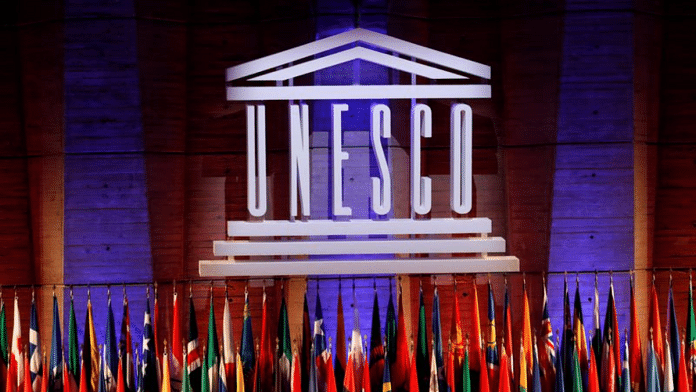New Delhi: Pakistan beat India with more than double the votes to secure the post of vice-chair of the United Nations Educational, Scientific and Cultural Organisation (UNESCO) executive board last week. While 38 members of the 58-member executive board voted for Islamabad’s candidate, only 18 voted for New Delhi’s representative, and two countries abstained.
The executive board is one of the three constitutional organs of UNESCO — a specialised agency of the United Nations (UN) aimed at promoting world peace and security through international cooperation in education, sciences, culture, communication and information. The other two are the general conference and the secretariat.
India was elected to the UNESCO executive board in 2021 for a four-year term till 2025. Pakistan was elected earlier this year for a four-year term that will end in 2027.
India’s defeat in this vote contravenes decades of its diplomatic policy approach to such elections. “India’s policy has always been to stand in elections that are winnable. If the election is deemed risky, then full efforts are made to ensure India’s victory,” an individual familiar with the matter told ThePrint.
This also comes at a time when India has been projecting itself as the ‘voice’ of the ‘Global South’ — a term used to refer to low- and middle-income countries located in the Southern Hemisphere, mainly in Africa, Asia and Latin America. While the election was held by secret ballot, that India received only 18 votes suggests that these ‘Global South’ countries may have largely sided with Pakistan, since they form the majority of the board members.
The bureau of the executive board consists of 12 members — the chairperson, six vice-chairpersons and the five chairpersons of the permanent commissions and committees. The key roles played by the bureau include setting the agenda and allocating time for executive board meetings. The vice-chairperson has no decision-making powers.
All members of UNESCO are grouped into six regional electoral groups, and each such group is represented by a vice-chairperson. This latest election won by Pakistan was for the vice-chairperson of Group IV, which includes Australia, Bangladesh, China, Cook Islands, India, Indonesia, Japan, the Philippines, Republic of Korea, Sri Lanka and Vietnam.
On 24 November, the spokesperson for the Ministry of Foreign Affairs of Pakistan had posted on X, stating that Islamabad was elected as vice-chairperson with “overwhelming support”.
Pakistan has been elected, with overwhelming support, as Vice Chair of UNESCO Executive Board (term 2023-25) from Asia Pacific Group at the ExB Session. Grateful to all members for their trust and support. 🇵🇰 is deeply committed to cooperative multilateralism and looks forward to… pic.twitter.com/Bd1YRuiIJy
— Spokesperson 🇵🇰 MoFA (@ForeignOfficePk) November 24, 2023
India’s permanent representative to the UNESCO is a political appointee, Vishal V. Sharma, a former independent director of Bharat Petroleum Corporation Limited (BPCL) as well as former officer on special duty to Narendra Modi when he was Gujarat chief minister.
In a post on X, Sharma defended India’s performance at the UNESCO saying, “India’s performance in #UNESCO has been unprecedented in recent times.”
India’s performance in #UNESCO has been unprecedented in recent times:
1) #India was the Chair of the Finance & Administration Commission of UNESCO (2021-2023). It was for the first time since 1966, that India held the position. India was member of the ExB bureau.
For… pic.twitter.com/9fllJYIJkh
— Vishal V. Sharma 🇮🇳 (@VishalVSharma7) December 1, 2023
He pointed out that India has been a member of the executive board bureau since 2021 as a chair of the Finance & Administration Commission of UNESCO (2021-2023) — the first time it’s held the post since 1966.
Also Read: Karnataka’s Hoysala-era temples are under pressure–from UNESCO glory, selfie-taking tourists
Role of executive board, chair and vice-chair
Members to the executive board are elected by the general conference. This board acts under the authority of the general conference and exercises specific functions assigned to it by the constitution of UNESCO.
The executive board prepares the agenda of the general conference and examines the programme of work for UNESCO and corresponding budget documents, makes recommendations on the admission of new members, recommends to the general conference vis-a-vis the appointment of the director-general of UNESCO, is responsible for execution of the programme adopted by the general conference, and summons extraordinary sessions of the general conference.
The chairperson of the board elected from its members declares the opening and closing of meetings, directs the discussions, ensures observance of rules of procedure and accords the right to speak. The chair also rules on points of order, puts questions to vote and announces the results, represents the board with member states, the UN and other specialised agencies.
The six vice-chairpersons, in the absence of the chairperson during a session, exercise the chair’s functions.
Vera Lacoeuilhe, the representative of St. Lucia, was elected as chairperson of the executive board last week, following which elections were held for the position of vice-chairperson representing the six electoral groupings that make up the UNESCO.
The six groupings are: Group I (Western Europe and North American States), Group II (Eastern European States), Group III (Latin America and Caribbean States), Group IV (Asian and Pacific States), Group V (a) (African States) and Group V (b) (Arab States).
Vice-chairpersons representing Groups I, II, III, V (a) and V (b) were elected by consensus. Voting was held only in Group IV — which includes Pakistan and India as members.
In the past, three Indians have been chairpersons of the executive board — S. Radhakrishnan (1948-1949), Arcot L. Mudaliar (1954-1956) and Prem N. Kirpal (1970-1972).
The six vice-chairpersons for 2023-2025 are: USA (Group I), Lithuania (Group II), Haiti (Group III), Pakistan (Group IV), Botswana (Group V (a)) and Oman (Group V (b)).
(Edited by Gitanjali Das)
Also Read: UNESCO recommends to take Great Barrier Reef off danger list, still warns of ‘serious threat’



